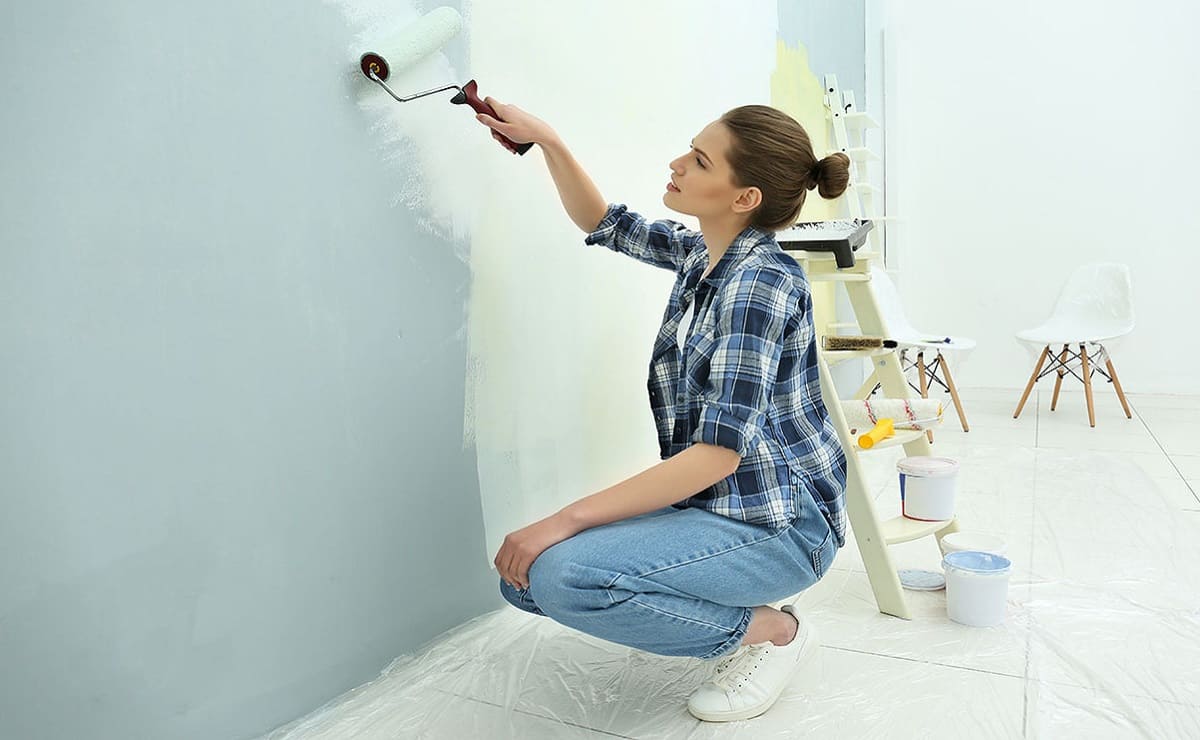One of the most common blunders when painting walls or ceilings is not protecting the floor, furniture and nearby objects before painting. Even covering them with paper or cloth, in this process it is inevitable that, by a small oversight, drops and debris may fall and end up causing stains that are somewhat difficult to remove with ordinary cleaning.
Removing this dirt is a real headache, so it is best to clean them before they dry and penetrate the material, especially when it comes to porous surfaces such as marble, terrazzo, or travertine.
Don’t get frustrated, everything has a solution! And sometimes it’s simpler than it looks. Before we revealed to you the right way to clean old hydraulic tiles, in this article we show you how to remove the paint from the floor according to the type of floor. Pay attention and know the correct method to solve this type of stains in an effective, fast and safe way.
How to remove paint from cement floor
When it comes to removing paint stains on rough floors of this kind, you should know that this material absorbs substances very quickly, so acting immediately is the smartest thing to do. To remove them, do the following:
- Acquires Salfuman or muriatic acid (powerful stain remover).
- Put on gloves and goggles before proceeding to clean the floor.
- Pour a little of this product on the floor and spread it with the mop over the entire stained area, rubbing with special attention to the most affected places.
- Wait a couple of minutes for the liquid to act (not too long so as not to affect the shine).
- Rinse the floor several times with another clean wet cloth until the paint and stain remover residues are completely removed.
This trick works well on brick, terra cotta, clay tile, concrete or slate.
How to remove paint from wood or parquet floor
In the case of wooden floors, special care and proper maintenance are essential to avoid damaging them and causing even worse stains. If the stain has dried and has adhered to the surface, it will be quite difficult to fight it due to the delicacy of this material. However, it is possible with this technique:
- Oil paint stains (varnishes or synthetic enamels): Apply paint remover in a bucket of warm water and a little floor cleaner soap. If their composition contains alcohol, be cautious, as they can damage the finish of the wood.
- Water-based paint stains (acrylic, latex or plastic): With a cloth, hot water, neutral soap and rubbing with a sponge will be enough to soften and remove it. If large drops of paint are very stuck, use a knife or spatula to remove them, but remember to be careful not to scratch or cut the wood.
Note: In case you have tried both ways and they have not worked,we recommend sanding, painting and varnishing again.
How to remove paint stains from porcelain floors
Porcelain floors are minimally porous, which makes them almost impermeable. The same is true for earthenware and porcelain stoneware, which, although they do have porosity, the upper glaze reduces absorption capacity almost to a minimum. If you want to learn how to remove oil paint from porcelain floor, check out this procedure:
- The first step is to buy in the supermarket a specific cleaner for porcelain surfaces. Our favorite is the universal alkaline stripper for all types of floors (it also removes grease and rust very efficiently).
- Then, you must put on goggles, multipurpose gloves and a protective mask to prevent overexposure to the product’s acids from generating harmful effects on your health.
- Once this is done, apply some clean and warm water on the floor and then, pour a little of the chemical product on the paint stains and let it act for 25 minutes.
- Rub with a brush and, if necessary, scrub cautiously with a metal spatula or scraper to remove the paint.
- Once the residues are removed, remove the excess with a mop and water to leave it completely clean and dry.
- Finally, add shine with special wax for the type of floor you are cleaning. Just apply it with a string mop, leave it on for 5 minutes and pass the polishing machine or a dry cloth at the end. If you want it to look glossier, apply another coat one hour after the first application.
This method is ideal for natural stone floors such as marble, terrazzo, granite and even plastic floors, since it removes dirt and waxes without excessively opening the pore.
Now that you know the techniques to get rid of paint marks on the floor, don’t forget that the most infallible trick of all is prevention. Protect surfaces, windows, couches, chairs, appliances and anything else in the vicinity of the room with plastic, paper, tape or cloth.

